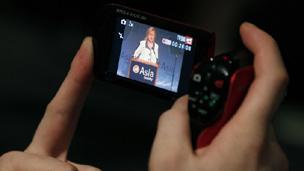Let bloggers film meetings, Eric Pickles tells councils
- Published

'Online broadcasters' should get the same access as traditional media, says Mr Pickles
Councils should allow bloggers to film their meetings, Communities Secretary Eric Pickles has said.
His department has contacted councils to ask that they adopt a "modern-day approach".
It follows reports that some bloggers were stopped from using Twitter or filming during public meetings.
Mr Pickles said it was important local bloggers were given the same access as professional journalists at a time when budget decisions are being made.
He said: "Fifty years ago, Margaret Thatcher changed the law to make councils open their meetings to the press and public. This principle of openness needs to be updated for the 21st Century. More and more local news comes from bloggers or citizen journalists telling us what is happening at their local council.
"Many councils are internet-savvy and stream meetings online, but some don't seem to have caught up with the times and are refusing to let bloggers or hyper-local news sites in."
He added: "Opening the door to new media costs nothing and will help improve public scrutiny."
Data protection
Mr Pickles said a decision by Tameside borough council, in Greater Manchester, to accredit professional journalists to use the micro-blogging website Twitter meant "local bloggers, the public and even councillors are not permitted to 'tweet' because they are not considered members of the press".
And he pointed out that Windsor and Maidenhead borough council had "raised concerns about videoing, citing 'Data Protection'." Blogger Chris Taggart published footage on his own website of his unsuccessful efforts to film the council's meeting.
Windsor and Maidenhead said a motion to allow people to film their meetings "provided anyone wishing to record them complies with obligations under the Data Protection Act", was expected to be approved on Tuesday.
Tameside council argued at the time that it was complying with the Local Government Act 1972, which states that councils are not required to allow photos to be taken of meetings "or the use of any means to enable persons not present to see or hear any proceedings".
It argued that it was "obliged to consider specific requests to use media such as 'Twitter'" and had allowed the Manchester Evening News, Tameside Advertiser and Tameside Reporter to do so "as duly accredited representatives of the press, as defined in the Local Government Act 1972".
Local government minister Bob Neill has written to local councils to "remind" them that meetings are already open to the public. It also "reassured councils that giving greater access will not contradict data protection law requirements" in most cases.
The move was backed by Mr Taggart, who founded the website OpenlyLocal.com, who said "hyperlocal" bloggers were doing some of the best council reporting in the country and it was "crazy" for councils to stop people "videoing, tweeting and live-blogging their meetings".
Recently journalists have been allowed to "tweet" from some court cases. The Supreme Court, the highest in the UK, has ruled that journalists, the public and legal teams can use "live text-based communications" in its courtrooms, although some exceptions remain.
But MPs were warned last month against using Twitter during Commons sessions.
- Published3 February 2011
- Published19 January 2011